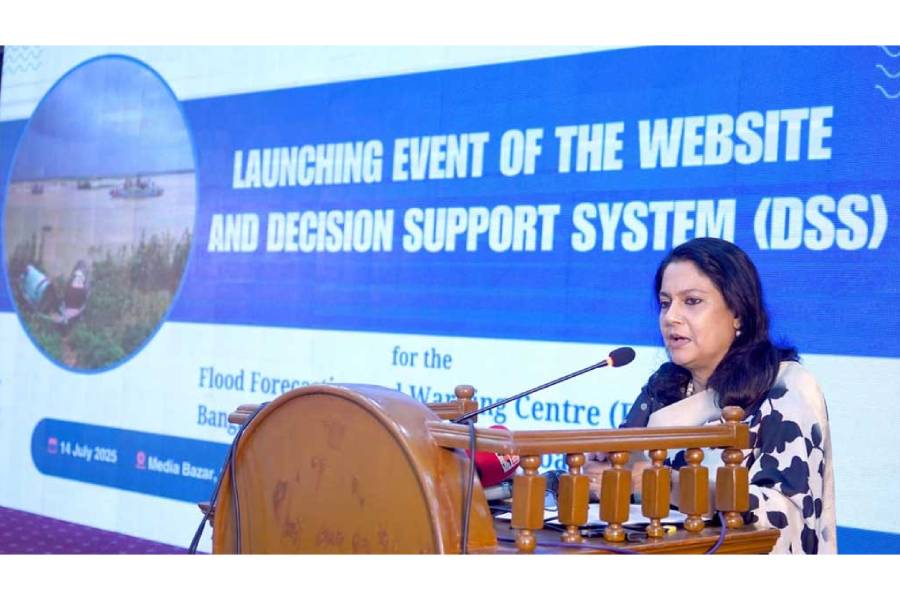
Published :
Updated :

Water Resources Advisor Syeda Rizwana Hasan has said that Bangladesh is often left unprepared for floods as upstream countries release water from dams without providing advance notice.
She mentioned that without timely information on the volume and intensity of water flow, it becomes difficult for Bangladesh to take necessary precautions.
Bangladesh’s primary upstream country is India.
Speaking at the launch of a new website and Decision Support System (DSS) for flood forecasting and warning at the Bangladesh-China Friendship Conference Centre on Monday, Rizwana stressed the urgency for real-time data sharing.
The new services have been introduced jointly by the Bangladesh Water Development Board, the Regional Integrated Multi-Hazard Early Warning System (RIMES), and the World Bank’s “CARE for South Asia” project.
“I’ve learned that we don’t have any real-time data. If the upstream country doesn’t inform us in advance, then we are left in the dark. If they tell us just two hours before opening the floodgates, that doesn’t give us any time to prepare,” she said.
She added that efforts are under way to reach an agreement with the United Kingdom to access real-time data.
“If we get just two hours’ notice, and it takes 6-8 hours for the floodwaters to reach us, the alert might even come in the middle of the night. That’s not enough time for preparations,” she explained.
“That’s why we’ve spoken to the UK, and they have shown interest in helping us access site-specific real-time data.”
Rizwana noted that infrastructure alone is not enough to cope with the growing threat of floods.
Referring to the recent flooding in Feni, she warned: “This incident has heightened our concerns. We are heading into more frequent and intense events.”
“How much infrastructure can realistically be built to tackle 549mm of rainfall or withstand water levels rising 21ft?” she said.
Rizwana also stressed the need for flood and rainfall forecasts, along with risk assessments for river erosion in vulnerable areas.
According to her, the newly launched website will provide 10-day forecasts of rainfall and water level fluctuations, as well as alert notifications. It will also contain historical data on rainfall and flooding to help with research and planning.
Rizwana called for greater investment in disaster preparedness, saying: “The government must invest a lot of money, and also intellect and labour. They must improve their communication and networking. If we are serious about addressing the impacts of climate change, this must become our top priority.”
Water Resources Secretary Nazmul Ahsan said that since 2012, Bangladesh has issued 5, 10, and 15-day flood forecasts with the help of RIMES, significantly improving national response to flooding.
Raihanul Haque Khan, country programme lead at RIMES, said the DSS is being upgraded from risk-based forecasting to impact-based forecasting to identify the most vulnerable areas.
He emphasised the importance of circulating flood alerts as voice messages, noting that timely warnings in 2024 helped avoid major financial losses.
The new DSS platform is expected to bring a new dimension to disaster preparedness, early warning systems and inter-agency coordination in Bangladesh.
It will work in collaboration with the Department of Disaster Management, Department of Agricultural Extension, and Department of Livestock Services.
With voice messages, digital display boards, and mobile features, the platform aims to extend critical services to grassroots communities.


 For all latest news, follow The Financial Express Google News channel.
For all latest news, follow The Financial Express Google News channel.